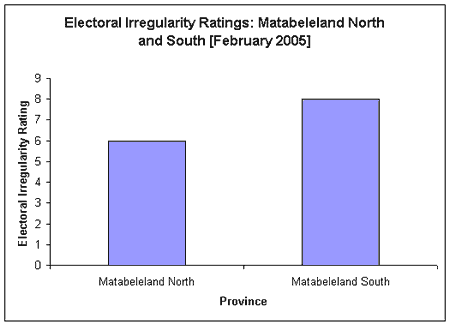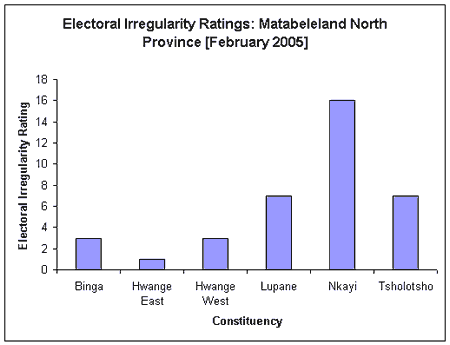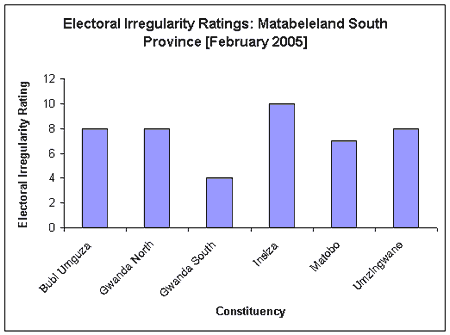|
Back to Index
Election
Climate Report No. 01
National
Constitutional Assembly (NCA)
February
20, 2005
Download
this document
- Word
97 version (209KB)
- Acrobat
PDF version (159KB)
If you do not have the free Acrobat reader
on your computer, download it from the Adobe website by clicking
here.
The
Election Climate Reports are produced by the NCA in order to provide
information on the prevailing climate for citizen participation
in the forthcoming Parliamentary Election. The NCA has already communicated
its condemnation of the constitutional framework under which the
elections are being conducted. The Report is a consolidated statement
of the reports sent in by a national network of community monitors.
The community
reports sample a number of electoral "atmospherics" (described
below), which aim to provide a clear description of the state of
affairs prevailing in any one constituency:
- Freedom of
Association;
- Freedom of
Assembly;
- Freedom of
Movement;
- Freedom of
Expression;
- Incidence
of Political Violence;
- Disputes
over electoral procedures and electoral irregularities;
- Occurrence
of voter education;
- Use of food
as a political weapon.
The reports
sample 18 critical indicators and hence provide a simple score for
any one constituency, which we have termed the "Electoral Irregularity"
[EI] score: the higher the EI score, the worse the electoral climate
in a constituency.
Overview:
This
first report covers only two provinces, Matebeleland North
and South. In the period under report, 14 to 20 February
2005, there was little physical violence but there were many incidences
of threats and intimidation and infringement of personal freedoms.
The figure below indicates the two provinces’ Electoral Irregularity
[EI] ratings.

As can be seen from the
figure above, Matabeleland South appeared to be less free than Matabeleland
North, but, in both Provinces, there was variation between the constituencies.
For example, in Matabeleland North, Binga [3], Hwange East [1] and
Hwange West [3] had low EI ratings according to the reports, but
Bubi Umguza [8], Nkayi [9], Lupane [16], and Tsholotsho [7] had
relatively EI high ratings. In Matabeleland South, only Gwanda South
[4] had a low EI rating, whilst the remainder - Gwanda North
[8], Insiza [10], Matobo [7], and Umzingwane [9] - all had EI ratings
of 7 and above.
The types of irregularities
observed varied between the constituencies, but overall the information
received suggests that, in both of these two Provinces, the current
climate is not conducive to full citizen participation in the elections.
It is noteworthy that political violence was reported in all constituencies,
but this was mostly in the form of hate speech, threats, and intimidation
rather than physical violence.
As will be seen below,
there are far too many reports indicating that there is interference
with citizens' expression of their basic freedoms. Perhaps
more serious in the current situation, are the observations that
political muse of food was seen in 5 of the constituencies covered
in this report.
The NCA requests that
all these allegations receive immediate attention from the electoral
authorities and the political parties. The NCA also requests that
all bodies concerned with peace building give these allegations
their fullest attention.
Matabeleland
North Province:
As
is seen from the Figure below, there was variation between the constituencies
in Matabeleland North, with Nkayi the worst of the 7 constituencies
reported upon.

During the reporting
period, members of the opposition have been unable to wear their
party insignia, people have been forced to attend political meetings
and chant Zanu slogans. In Nkayi, it was interesting to note that
the MDC was unable to wear their party insignia and Zanu PF was
unable to put up its posters. Out of the 7 constituencies, 5 reported
inference with freedom of association, 3 reported interference with
freedom of assembly, and 6 reported interference with freedom of
movement.
There are reports of
new residents, purportedly prospective voters, in the various constituencies
being introduced in preparation for the March elections. This has
apparently been motivated by promises of food. The youth militia
have been reported as being behind the forced movement of people
to and from constituencies.
There are reports of
people who have been unable to read the newspapers of their choice
and unable to express their views in public. Fear has been the major
reason for the lack of freedom of expression: there have been threats
of violence, incidents of beatings, and arrests for openly expressing
political opinions.
In respect to freedom
of assembly, Mat North had several incidents, but Binga, Bubi Umguza,
Hwange and Tsholotsho had no such reports. This refers to the numbers
of political meetings people have been forced to attend, as well
as being unable to attend the political meetings of their choice.
The non-ZanuPF meetings were reported as being disrupted by the
police under POSA, which ensured that only ZanuPF meetings were
held.
As mentioned above, there
was little physical violence, but intimidation and threats were
reported in all the constituencies, with Nkayi being the worst affected.
The physical violence reported was alleged to be torture perpetrated
by Zanu PF and the youth militia. There were also reports of gender-based
violence where the women were forced to go to party bases. Interestingly,
in one of the reports, the victims were ZanuPF female members forced
to go to ZanuPF bases.
Electoral disagreements
were noted in Bubi, Lupane and Nkayi, but the other constituencies
were quiet. In terms of voter education there was hardly any group
doing this. There were however several incidents of politically
aligned distribution of food, especially in Lupane and Nkayi.
Matabeleland
South Province:
The
EI ratings in this province were higher on average than in Matabeleland
North, but they also showed a greater range: EI ratings here ranged
from between 3 and 10 as opposed to between 2 and 17 in Matabeleland
North.
Interference with freedom
of association was reported in all 5 constituencies, whilst interference
with freedom of movement was seen in 4 of the 5 constituencies,
as was interference with freedom of movement.
There were instances
where the opposition was unable to wear their insignia and unable
to put up their posters. This was reflected in all except one constituency.
In Matobo, Insiza, and Umzingwane, there were reports of people
being forced to attend ZanuPF meetings. MDC was able to hold several
meetings in Matabeleland South but ZanuPF were able to hold more
meetings than the MDC.
There were reports
of infringements of freedom of movement: ZanuPF officials are said
to randomly stop and ask anyone they see walking around what their
business is. In Gwanda South, it was reported that the police and
ZanuPF have established a 9pm curfew. There were no reports of any
new people moving into the constituencies, nor reports of anyone
having problems leaving the area.

There is fear reported,
amongst mostly the MDC, with regard to expressing their views in
public, but, in Umzingwane, it was reported that ZanuPF members
are afraid to express themselves in public as well. In Gwanda, it
was stated that civic organisations are afraid to voice their opinions,
due to fear brought about by the NGO Bill. These organisations together
with the MDC are unable to read newspapers of their choice.
Political violence was
reported in all constituencies, mostly in the form of intimidation
and threats. Intra-party violence was reported amongst ZanuPF supporters,
and it was also noted that there were Zanu PF party bases in almost
all the villages especially in Gwanda North. In Insiza, hate speech
and intimidation was reported with ZanuPF being the culprits, with
the targets being the MDC and other groups.
There were reports of
election irregularities in three of the 5 constituencies in Mat
South. The main election disagreements were between ZanuPF and MDC
with regard to the administration of the elections. Some voter education
was said to be taking place, but not in most of the constituencies,
and was being done primarily by ZanuPF and the ESC. Political use
of food was reported in 3 of the 5 constituencies, with Zanu PF
being named as the only body distributing food. It was reported
that access to food was dependent on the possession of a ZanuPF
party card.
Recommendations:
The
types of irregularities observed varied between the constituencies,
but overall the information received does not suggest that, in either
of these two Provinces, the current climate is conducive to full
citizen participation in the elections. As will be seen below, there
are far too many reports indicating that there is interference with
citizens' expression of their basic freedoms. Perhaps more
serious in the current situation, are the observations that political
muse of food was seen in 5 of the constituencies covered in this
report.
These allegations must cause considerable concern for the possibility
of holding free and fair elections, and the NCA calls on the electoral
authorities and the political parties participating in the elections
to take immediate steps to investigate these allegations. The reports
indicate that, in particular, the constituencies of Nkayi, Insiza,
Lupane, Umzingwane, and Bubi Umguza are "hotspots",
and deserving of more urgent attention. All authorities should take
determined steps to correct all irregularities, and create a climate
for ordinary citizens' fullest participation in these elections.
The NCA also calls upon
all its civic partners, and especially those concerned with the
building of peace in local communities, to take immediate steps
to investigate these allegations, and, where confirmed, to bring
the problems to the attention of local community structures and
peace committees.
The NCA wishes
to bring these allegations to the attention of all regional and
international observer groups, and urges such groups to give these
allegations their fullest attention.
Download
and read the full report
Visit the NCA
fact
sheet
Please credit www.kubatana.net if you make use of material from this website.
This work is licensed under a Creative Commons License unless stated otherwise.
TOP
|

